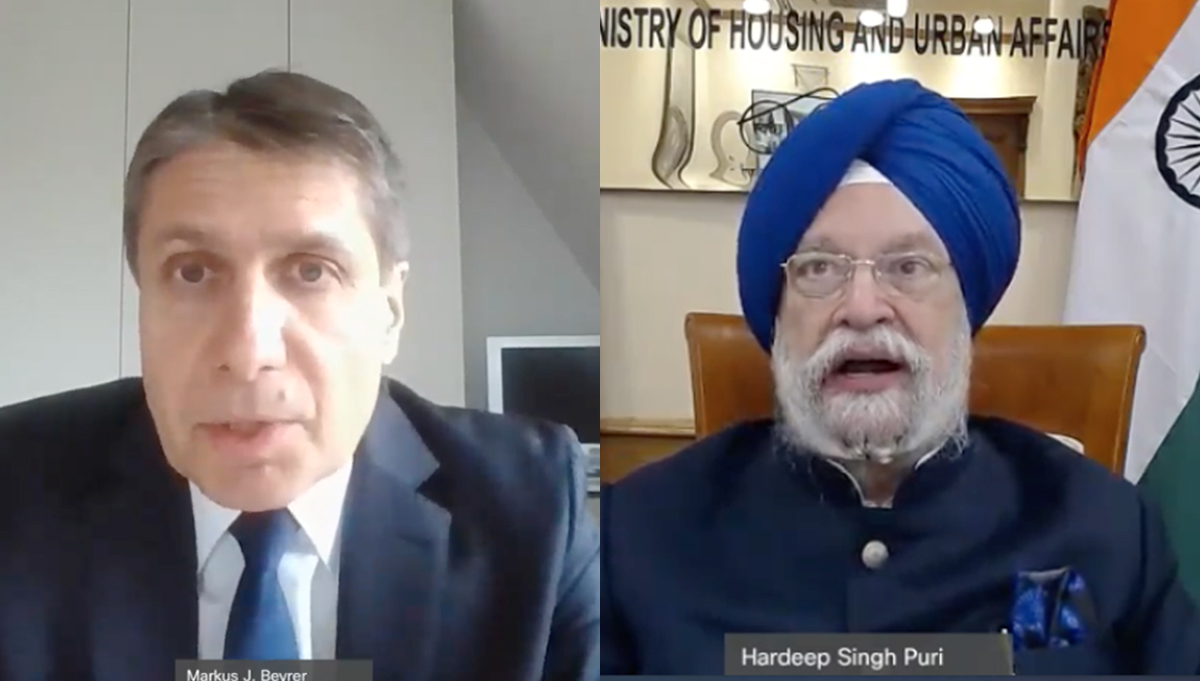BusinessEurope Headlines No. 2020-42
European business encourages closer engagement between Europe and India

“Europe and India share some common challenges, have common interests, and are in a position to seize the opportunities this presents”, Markus J. Beyrer, Director General of BusinessEurope, said at the Confederation of Indian Industry’s (CII) Partnership Summit 2020, held online today. He pointed out that although the international environment is challenging for businesses, with the pandemic, economic headwinds, and a fractured geopolitical environment, both Europe and India support rules-based trade, seek to promote connectivity, and foster innovative business climates. India could become an even greater market for European companies as they seek to make their supply chains more resilient, though this would require a number of steps on the part of India, such as continued improvements in the business climate, investment facilitation and protection, and openness to trade. “This opportunity is also particularly attractive against the backdrop of rising tensions between the USA and China. The rationale for greater engagement between the EU and India is currently therefore at a high point, and we are happy to support this in every way we can”, Beyrer concluded.
Contact: Maurice Fermont
Our comment:
COVID has ravaged our economy in 2020, but we should remain hopeful for 2021 and beyond
By James Watson, Director of Economics
 2020 will be a year many people will be happy to see the end of, with losses in terms of freedom and welfare vastly exceeding simple GDP falls. But whilst our freedoms may quickly return in 2021, ensuring economic losses are not sustained for much longer will require a strong policy framework supporting investment, innovation and education.
2020 will be a year many people will be happy to see the end of, with losses in terms of freedom and welfare vastly exceeding simple GDP falls. But whilst our freedoms may quickly return in 2021, ensuring economic losses are not sustained for much longer will require a strong policy framework supporting investment, innovation and education.
2020 has seen the biggest falls in global output since the 1930s, but even losses of 7% for the EU this year, as BusinessEurope's forecast currently suggests, equate only to bring GDP back to 2015 levels. The welfare losses incurred by COVID-19 are clearly much larger. Most tragically, hundreds of thousands of people across the EU have lost their lives, with many more suffering bereavement. Alongside this is the damage to our mental health, including to the millions whose jobs have been lost or put at risk by the pandemic. And GDP losses also fail to reflect the fall in non-market activities, such as meetings with friends and family, and missed opportunities to enjoy sports, concerts and festivals.
Analysis by McKinsey suggests that at the height of lockdown in April, the pandemic's negative impact on well-being was up to 3.5 times the losses experienced in GDP. Whilst their 10 point measure of wellbeing across the EU and UK fell from 6.70 to 6.32 during the lockdown, only 18% of this fall was accounted for by loss of income.
Throughout 2020, governments have committed huge sums to preserve jobs by helping businesses survive the crisis, as lockdown restrictions have vastly reduced their revenue. This rightly reflects the fact that long-term economic losses from this crisis will to a large extent depend on our ability to minimise economic scarring. It occurs because even in the most efficient markets, both workers and capital, equipment and premises, are rarely redeployed quickly or as productively when firms close and workers lose their jobs. Even in the best case scenario where people find jobs in industries in which they are best able to deploy their skills, productivity losses occur, as workers need to redevelop the firm specific skills and knowledge to deal with different internal processes, rebuilding the so called firm-specific intangible capital.
As well as retaining existing intangible and physical capital, new investment is also crucial for long-term growth. Overall physical investment fell by around 25% in the Spring; but whilst other parts of the economy have started to bounce back, the continuing uncertainty associated with the crisis, including the risk of prolonged restrictions on activity, means many companies continue to postpone new investment projects.
One crucial source of new investment, albeit not measured as such in government accounts, is education. Schools across the Europe have made valiant efforts to maintain teaching, including through home-based learning. But studies such as that by the UCL Institute for Education in the UK, suggest around 1/5th of pupils, often the most disadvantaged, undertook less than an hour of learning a day, with the average just 2.5. Such losses have important implications both for individuals, and the broader economy, with studies[i] suggesting that the loss of a quarter of a year of teaching reduces life-time earnings of an individual by an average of around 2-2.5%.
It is these concerns, as well as the long-term challenge of strengthening public finances against a backdrop of population ageing, that is behind comments such as those by the UK Finance Minister Rishi Sunak that the economic emergency has only just begun. Policies governments adopt in 2021 will continue to have huge implications for the depth of economic scarring and growth prospects for much of the decade.
Most urgently, Governments should use all tools at their disposal to address the continuing health crisis. For example, the former US Treasury Secretary Larry Summers has shown[ii] in the USA that rapid testing can deliver benefits 30 times greater than the cost. Similarly, the administration of vaccines needs to be an urgent priority.
Confidence that restrictions are ending and that demand is recovering are prerequisites for business investment. In the interim, the EU's Next Generation recovery instrument can play a crucial role in using public funds to support investment and build confidence. But rapid initiation of project in 2021 will be crucial to ensuring the fund's role is to kick-start the economy and not simply add further fuel when the recovery is at full steam.
Both Member States and the EU will also need to ensure that regulatory stances reflect the shattered balance sheets of many enterprises. For example, implementation of Basel III rules for bank capital in the EU will need to play increased attention to their potential impact on lending to companies.
Finally, we must think more radically about how we can address the short fall in education during the crisis, and ensure younger generations do not disproportionately bear the cost of this crisis. For example, many educational premises across the EU currently are usually empty throughout much of the summer, presenting scope to use the facilities next year for catch-up classes.
If governments can address these challenges in ways that support business investment and innovation, we should be optimistic our economies can emerge from the present crisis with renewed growth and prosperity. The rapid development of COVID vaccines, and the ability of many firms and workers to quickly transfer to remote working and production has reminded us in 2020 of our extraordinary capacity for innovation and technological advancement. It is this innovative and entrepreneurial capacity upon which we must build.
[i] Jonathan Portes, "The lasting scars of the Covid-19 crisis: Channels and impacts", VoxEU, June 2020
[ii] D. Cutler, L Summers, "The COVID-19 Pandemic and the $16 Trillion Virus", Coronavirus Resource Center, October 2020
Contact: James Watson
Our comment:
Privacy vs. access: the ongoing data challenge
By Patrick Grant, Adviser to the Digital Economy
 On a sunny afternoon in Oslo, Norway, 22 July 2011, a white van drove to the Regjeringskvartalet (government quarter) containing many offices, including that of the prime minister of Norway. It’s driver parked outside the main entrance and calmly walked away. 10 minutes later the van exploded causing a blast heard for 7 kilometres around, killing and changing the lives of many Norwegians forever. Later, the detonator of the blast, Anders Breivik, coldly moved to Utøya, a picturesque lake just outside of Oslo and gunned down 69 people, wounding several more, many of those school children attending a political youth camp. While this tragedy, the deadliest attack on Norway since 1940, collectively shook the country and indeed the world, it demonstrated the use of government intelligence cooperation.
On a sunny afternoon in Oslo, Norway, 22 July 2011, a white van drove to the Regjeringskvartalet (government quarter) containing many offices, including that of the prime minister of Norway. It’s driver parked outside the main entrance and calmly walked away. 10 minutes later the van exploded causing a blast heard for 7 kilometres around, killing and changing the lives of many Norwegians forever. Later, the detonator of the blast, Anders Breivik, coldly moved to Utøya, a picturesque lake just outside of Oslo and gunned down 69 people, wounding several more, many of those school children attending a political youth camp. While this tragedy, the deadliest attack on Norway since 1940, collectively shook the country and indeed the world, it demonstrated the use of government intelligence cooperation.
Within hours of the attack, previously collected personal data of European’s linked to Breivik was used by investigators, including Europol and 3rd country partners, such as the US Government, to stop another attack being carried out. This rapid use of data enabled authorities to arrest a person in Finland from carrying out similar atrocities and as a result saved countless lives.
The topic of data flows: who has access, how it can be exported and what protection is afforded, is a highly relevant topic. In July this year, the touch paper was ignited on a debate that had been waiting some time to come to the fore. Max Schrems, the Austrian Privacy activist now famous for bringing down both the safe harbour agreement and EU-US privacy shield, has forced Europe’s hand into determining once and for all: how to permit Europe to continue internationally collaborating while upholding the full privacy protection of citizens.
There is no doubt that Europe leads the globe in privacy protection through it’s General Data Protection Regulation (GDPR). This first in its class law places numerous obligations on how businesses and governments can process the data of European citizens while offering them various rights. Its ambitious application applies exterritorialy, meaning entities outside of the European Economic Area processing the data of Europe’s citizens has to apply it. This jurisdictional issue is potentially where current friction is being felt.
Of course, as Europe cooperates in a globalised world, where data is used seamlessly without recognising geographical borders, it makes sense to apply protections to its citizens internationally. Various GDPR compliant tools have been used to bring these protections to life. One such mechanism, favoured by European businesses, are Standard Contractual Clauses (SCCs).
Used directly by 75% of businesses in Europe, SCCs are a vital tool to offer goods and services to the European market or compete in those abroad. These detailed terms and conditions are signed up to and followed by the exporter and importer of the data leaving Europe to ensure it’s continued protection. As a result, the exterritorial nature of the GDPR is upheld. However, more recently, the use of SCCs has been called into question.
In July 2020, Europe’s highest court (the Court of Justice of the EU) held that SCCs alone could not be relied upon as a safe data transfer mechanism. Instead, businesses would now be tasked with carrying out a risk assessment on the 3rd countries domestic laws to which the data was travelling in order to determine whether it was essentially equivalent with the GDPR. This raised great concern among European businesses, particularly SMEs to which 75% rely on SCCs. It has been viewed as effectively outsourcing data protection decision making from the European Commission to businesses. How are these risk assessments to be carried out? On what basis are decisions to be made? And who is to confirm that a business’s final decision is correct?
Enter the European Data Protection Board (EDPB), Europe’s quasi data protection regulator. Businesses had been calling for the EDPB to bring Guidelines forward to complement the CJEU ruling to clarify the legal uncertainty it had left. Yet in November this year, the EDPB took the opportunity to deliver Recommendations that sent shock waves through the international privacy community. In draft form and still under consultation, the surprisingly tough approach from the EDPB was that all data leaving the EU was to be considered the same, whether of potential interest to a foreign security agency or not. As a result, it proposes all businesses to implement tough end-to-end encryption measures on all data transfers and leave the decryption keys in the EU. In layman’s terms: data travelling outside of the EU under an SCC would never be able to be decrypted, meaning no data importer could ever make sense of the data it was being sent.
The EDPB has clear intentions of ensuring the protection of European’s through these Recommendations, indeed it seems doubtful that any business would rely on an SCC as a data transfer tool if it would now have to exist under this new paradigm. Who would want to send data out of Europe that could never be read by it’s recipient? Is this extreme stance the most strategic option for Europe on the whole?
While it is understandable that the EDPB needs to be an independent body, it is concerning that it can pass such drastic changes to the functioning of the GDPR without fully weighing up other considerations. If Europe is to take such a drastic and unpragmatic approach to international data flows, what will that mean for the quality of goods and services provided in Europe, let alone our collaboration with international partners on everything from protecting the security of our citizens to overcoming the ongoing COVID-19 crisis? The fact such issues cannot be weighed up by the EDPB seem to be a fault by design rather than their own nature.
The EDPB will soon make their final decision to which European regulators will apply, any business thereafter in breach of those rules when using an SCC will be liable for up to 4% of their annual turnover. As a result, it seems the need for adequacy decisions, a power granted by the Commission stating that data can pass between the EU and the chosen 3rd country without any further safeguards, has become even more important for the future of Europe’s role in the global economy.
The USA is a primary target for the EU to forge a new adequacy decision with, not only as the EU-US data flow represents the largest in the world, supporting European international and single market trade, but also as both sides have spent a lot of diplomatic capital in sustaining its proper functioning. Since the CJEU recently invalidated the second EU-US adequacy decision in just 5 years however, what is realistically possible for supporting the transatlantic economy going forward? Some believe a lot, viewing the incoming President as a source for hope at aiding greater transatlantic cooperation. And that may be true, but the question surrounding what more the USA can offer the EU in terms of further protection that does not drastically overhaul its own national security practices, still needs to be answered. In so doing, US commentators wouldn’t be far wrong to highlight that European governments carry out similar data collection practices to protect its own citizens and these powers remain with the Member States, not the Commission.
As if the situation could not get more complex, the exit of the United Kingdom is about to take place potentially in its most brutal form. With no adequacy decision agreed alongside a potential “deal” or “no-deal” exit, a large economic partner and member of the “five eyes” community is about to be cut off from freely flowing data to and from the EU. Many, including the British government question why the EU has withheld what seems a straight forward approval of its adequacy, especially since the UK led the way in implementation of the GDPR itself. What concerns EU officials however is the future. The Prime Minister has been previously upbeat on the UK’s bid to create a new international data regime, diverging from that of the GDPR. The UK has also been known for carrying out bulk data collection practices in support of national security and recently signed an agreement on security data sharing with the USA.
This sets the EU up for quite the conundrum to solve. While it leads in digital regulation, such as the GDPR, it has ground to make up in the global AI race, not to mention the data economy. The delivery of initiatives supporting both are underway. But the Commission’s next move in terms of privacy and whether it will take a more pragmatic or closed approach to the international community will impact its wider political ambitions. Privacy and the implementation of the GDPR can no longer be viewed in a vacuum.
The ability to collect and process data will have an impact on us all. While its more flexible collection, use and cooperation cannot entirely protect us from all foreseeable events, such as those in 2011 in Norway, and without proper privacy safeguards could even fall into the wrong hands and cause further damage, the time has come to realise that international cooperation in the global data economy cannot be just a one-sided debate focussing on privacy alone.
Contact: Patrick Grant
National recovery and resilience plans must deliver investment and reform
 The recovery and resilience plans that Member States are now developing in response to the EU's €750b Next Generation recovery instrument must deliver both growth enhancing investment and reform. This was the key message of BusinessEurope's Director of Economics, James Watson at a meeting of the Economic and Social Committee's European Semester group, on 16 December. Welcoming the agreement in the European Council to finalise both the EU's long-term budget and recovery instrument, Watson stressed that it is important that the legal texts are quickly agreed by the Parliament to allow rapid implementation. In particular, ensuring investment can start taking place as soon as possible will maximise the impact of the instrument on both growth and employment. BusinessEurope will work with Member Federations in 2021 to both help develop National Recovery and Resilience and assess their likely effectiveness.
The recovery and resilience plans that Member States are now developing in response to the EU's €750b Next Generation recovery instrument must deliver both growth enhancing investment and reform. This was the key message of BusinessEurope's Director of Economics, James Watson at a meeting of the Economic and Social Committee's European Semester group, on 16 December. Welcoming the agreement in the European Council to finalise both the EU's long-term budget and recovery instrument, Watson stressed that it is important that the legal texts are quickly agreed by the Parliament to allow rapid implementation. In particular, ensuring investment can start taking place as soon as possible will maximise the impact of the instrument on both growth and employment. BusinessEurope will work with Member Federations in 2021 to both help develop National Recovery and Resilience and assess their likely effectiveness.
Contact: James Watson
A functioning secondary raw materials market
 “Our focus going forward should be to create a quality market for secondary raw materials taking product and sector specificities into account”, said Environment and Energy Advisor Cecilia Serrano-Piedecasas. On 15 December, BusinessEurope joined its Polish member Lewiatan’s Circular Economy Council for an update on the state of play of the different initiatives presented under the 2020 Circular Economy Action Plan (CEAP). They held a discussion on the upcoming Environment Council conclusions of 17 December and the vote in the European Parliament's Committee on Environment, Public Health and Food Safety (ENVI) that will take place in January. Serrano-Piedecasas also highlighted how important the implementation of the waste legislation acquis is, as it is costing Europe up to € 4.8bn a year on non-compliance. Moving forward, it will be important to involve industry in the upcoming discussions to define circularity, as well as to remove obstacles for new business models (renting, etc.) in order to maximise product’s lifetime. Read BusinessEurope’s position on the CEAP.
“Our focus going forward should be to create a quality market for secondary raw materials taking product and sector specificities into account”, said Environment and Energy Advisor Cecilia Serrano-Piedecasas. On 15 December, BusinessEurope joined its Polish member Lewiatan’s Circular Economy Council for an update on the state of play of the different initiatives presented under the 2020 Circular Economy Action Plan (CEAP). They held a discussion on the upcoming Environment Council conclusions of 17 December and the vote in the European Parliament's Committee on Environment, Public Health and Food Safety (ENVI) that will take place in January. Serrano-Piedecasas also highlighted how important the implementation of the waste legislation acquis is, as it is costing Europe up to € 4.8bn a year on non-compliance. Moving forward, it will be important to involve industry in the upcoming discussions to define circularity, as well as to remove obstacles for new business models (renting, etc.) in order to maximise product’s lifetime. Read BusinessEurope’s position on the CEAP.
![]() Contact: Cecilia Serrano-Piedecasas
Contact: Cecilia Serrano-Piedecasas
Fostering researchers’ careers rhymes with business-academia permeability
 “Permeability between business-academia is a must if we want to increase EU’s research and innovation (R&I) performances”, stated Carolina Vigo, Adviser for R&I, at the Workshop of the Council’s European Research Area Committee “Labour market for researchers, skills, assessment and monitoring”, on 15 December. As showed by BusinessEurope’s paper, the availability of skilled people is the most important factor pushing European companies to invest in R&I outside Europe, whilst its unavailability represents an important obstacle for companies to develop research and development (R&D) projects in Europe. “The EU should develop clear expert exchange models. This would foster intersectoral mobility, support the employability of researchers and ultimately make Europe stronger in R&I”, Vigo pointed out. She suggested that developing dual career paths can be achieved by raising the attractiveness of industrial R&D, creating new dual-career contracts, providing publicly financed support and changing the culture.
“Permeability between business-academia is a must if we want to increase EU’s research and innovation (R&I) performances”, stated Carolina Vigo, Adviser for R&I, at the Workshop of the Council’s European Research Area Committee “Labour market for researchers, skills, assessment and monitoring”, on 15 December. As showed by BusinessEurope’s paper, the availability of skilled people is the most important factor pushing European companies to invest in R&I outside Europe, whilst its unavailability represents an important obstacle for companies to develop research and development (R&D) projects in Europe. “The EU should develop clear expert exchange models. This would foster intersectoral mobility, support the employability of researchers and ultimately make Europe stronger in R&I”, Vigo pointed out. She suggested that developing dual career paths can be achieved by raising the attractiveness of industrial R&D, creating new dual-career contracts, providing publicly financed support and changing the culture.
![]() Contact: Carolina Vigo
Contact: Carolina Vigo
The involvement of patent users is key
 On 14-15 December 2020, the Administrative Council of the European Patent Office (EPO) held its virtual meeting and discussed, among other things, the report of activity of the EPO President, the Annual Work Plan 2021 and the common practices between the EPO and its Contracting States. BusinessEurope, represented at the meeting by Thierry Sueur and Elena Bertolotto, Chair of the Patents Working Group and Advisor for Legal Affairs, welcomed the results shown in these reports and thanked the EPO for the exchanges and fruitful cooperation during this difficult year. The adoption of common practices is certainly an important step as it is expected to increase legal certainty and be beneficial for businesses. Sueur also stressed that the involvement of users in EPO discussions is key for the development and well-functioning of the European patent system.
On 14-15 December 2020, the Administrative Council of the European Patent Office (EPO) held its virtual meeting and discussed, among other things, the report of activity of the EPO President, the Annual Work Plan 2021 and the common practices between the EPO and its Contracting States. BusinessEurope, represented at the meeting by Thierry Sueur and Elena Bertolotto, Chair of the Patents Working Group and Advisor for Legal Affairs, welcomed the results shown in these reports and thanked the EPO for the exchanges and fruitful cooperation during this difficult year. The adoption of common practices is certainly an important step as it is expected to increase legal certainty and be beneficial for businesses. Sueur also stressed that the involvement of users in EPO discussions is key for the development and well-functioning of the European patent system.
Contact: Elena Bertolotto
Happy holidays!
 BusinessEurope wishes you a festive season full of serenity and hope for a happy year 2021. Headlines will be back on 14 January.
BusinessEurope wishes you a festive season full of serenity and hope for a happy year 2021. Headlines will be back on 14 January.
Calendar 
- 1 January: Portuguese Presidency of the Council of the European Union
- 14 January: Headlines is back
- 22-25 February: EU Industry Week 2021
Not yet a subscriber? Register here.
Reminder: please have a look at our privacy policy